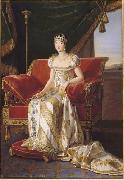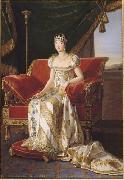Wholesale Oil Painting No Minimum |
|||||||||||
|
|
|||||||||||

|
|||||||||||
|
|
|
||||||||
Marie-Guillemine BenoistParis 1768-1826 was a French neoclassical, historical and genre painter. She was born in Paris, the daughter of a civil servant. Her training as an artist began in 1781 under Élisabeth Vigee Le Brun, and she entered Jacques-Louis David's atelier in 1786 along with her sister Marie-Élisabeth Laville-Leroux. The poet Charles-Albert Demoustier, who met her in 1784, was inspired by her in creating the character Émile in his work Lettres Émilie sur la mythologie (1801). In 1791 she exhibited for the first time in the Salon de Paris, displaying her mythology-inspired picture Psych faisant ses adieux sa famille. Another of her paintings of this period, L'Innocence entre la vertu et le vice, is similarly mythological and reveals her feminist interests in this picture, vice is represented by a man, although it was traditionally represented by a woman. In 1793, she married the lawyer Pierre-Vincent Benoist. Her work, reflecting the influence of Jacques-Louis David, tended increasingly toward history painting by 1795. In 1800, she exhibited Portrait d'une negresse in the Salon. Six years previously, slavery had been abolished, and this image became a symbol for women's emancipation and black people's rights. This picture was acquired by Louis XVIII for France in 1818. An important commission, for a full-length portrait of Napol on Bonaparte Premier Consul Français in this period was awarded to her in 1803. This portrait was to be sent to the city of Ghent, newly ceded to France by the Treaty of Luneville in 1801. Other honors came to her; she was awarded a Gold Medal in the Salon of 1804, and received a governmental allowance. During this time she opened an atelier for the artistic training of women. Her career was harmed by political developments, however, when her husband, the convinced royalist count Benoist, was nominated in the Conseil d'État during the post-1814 monarchy come-back called the Bourbon Restoration. |
||||||||
|
|
||||||||
Portrait of Pauline Bonaparte
Portrait of Pauline Bonaparte Painting ID:: 76637 |
1808(1808)
Oil on canvas
200 ?? 142 cm (78.7 ?? 55.9 in)
cjr 1808(1808) Oil on canvas 200 ?? 142 cm (78.7 ?? 55.9 in) cjr |
|||||||
|
|
||||||||
Marie-Guillemine BenoistParis 1768-1826 was a French neoclassical, historical and genre painter. She was born in Paris, the daughter of a civil servant. Her training as an artist began in 1781 under Élisabeth Vigee Le Brun, and she entered Jacques-Louis David's atelier in 1786 along with her sister Marie-Élisabeth Laville-Leroux. The poet Charles-Albert Demoustier, who met her in 1784, was inspired by her in creating the character Émile in his work Lettres Émilie sur la mythologie (1801). In 1791 she exhibited for the first time in the Salon de Paris, displaying her mythology-inspired picture Psych faisant ses adieux sa famille. Another of her paintings of this period, L'Innocence entre la vertu et le vice, is similarly mythological and reveals her feminist interests in this picture, vice is represented by a man, although it was traditionally represented by a woman. In 1793, she married the lawyer Pierre-Vincent Benoist. Her work, reflecting the influence of Jacques-Louis David, tended increasingly toward history painting by 1795. In 1800, she exhibited Portrait d'une negresse in the Salon. Six years previously, slavery had been abolished, and this image became a symbol for women's emancipation and black people's rights. This picture was acquired by Louis XVIII for France in 1818. An important commission, for a full-length portrait of Napol on Bonaparte Premier Consul Français in this period was awarded to her in 1803. This portrait was to be sent to the city of Ghent, newly ceded to France by the Treaty of Luneville in 1801. Other honors came to her; she was awarded a Gold Medal in the Salon of 1804, and received a governmental allowance. During this time she opened an atelier for the artistic training of women. Her career was harmed by political developments, however, when her husband, the convinced royalist count Benoist, was nominated in the Conseil d'État during the post-1814 monarchy come-back called the Bourbon Restoration. |
||||||||
|
|
||||||||
|
|
Portrait of Pauline Bonaparte
Portrait of Pauline Bonaparte Painting ID:: 78525 |
1808(1808)
Medium Oil on canvas
Dimensions 200 x 142 cm (78.7 x 55.9 in)
cyf 1808(1808) Medium Oil on canvas Dimensions 200 x 142 cm (78.7 x 55.9 in) cyf |
||||||
|
|
||||||||
|
Marie-Guillemine Benoist Paris 1768-1826 was a French neoclassical, historical and genre painter. She was born in Paris, the daughter of a civil servant. Her training as an artist began in 1781 under Élisabeth Vigee Le Brun, and she entered Jacques-Louis David's atelier in 1786 along with her sister Marie-Élisabeth Laville-Leroux. The poet Charles-Albert Demoustier, who met her in 1784, was inspired by her in creating the character Émile in his work Lettres Émilie sur la mythologie (1801). In 1791 she exhibited for the first time in the Salon de Paris, displaying her mythology-inspired picture Psych faisant ses adieux sa famille. Another of her paintings of this period, L'Innocence entre la vertu et le vice, is similarly mythological and reveals her feminist interests in this picture, vice is represented by a man, although it was traditionally represented by a woman. In 1793, she married the lawyer Pierre-Vincent Benoist. Her work, reflecting the influence of Jacques-Louis David, tended increasingly toward history painting by 1795. In 1800, she exhibited Portrait d'une negresse in the Salon. Six years previously, slavery had been abolished, and this image became a symbol for women's emancipation and black people's rights. This picture was acquired by Louis XVIII for France in 1818. An important commission, for a full-length portrait of Napol on Bonaparte Premier Consul Français in this period was awarded to her in 1803. This portrait was to be sent to the city of Ghent, newly ceded to France by the Treaty of Luneville in 1801. Other honors came to her; she was awarded a Gold Medal in the Salon of 1804, and received a governmental allowance. During this time she opened an atelier for the artistic training of women. Her career was harmed by political developments, however, when her husband, the convinced royalist count Benoist, was nominated in the Conseil d'État during the post-1814 monarchy come-back called the Bourbon Restoration. Portrait of Pauline Bonaparte 1808(1808) Medium Oil on canvas Dimensions 200 x 142 cm (78.7 x 55.9 in) cyf |
||||||||
|
|
||||||||
|
Prev Next
|
||||||||
|
|
||||||||
|
Related Paintings to Marie-Guillemine Benoist :. |
||||||||
|
|
||||||||
|
CONTACT US |


